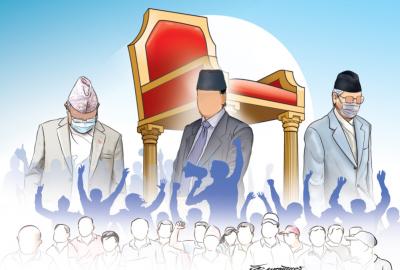The Head Teacher (HT) and School Management Committee (SMC) chair are key stakeholders in school performance as a whole. Keeping this in view, they are conferred with important powers and functions relating to finance, teacher appointment and building physical infrastructure, among others. However, such initiatives to strengthen school stakeholders have been crushed by party politics, an inert citizenry and poor policy framework in recent years.
Policy and practice
To illustrate how party politics takes its toll on the education sector, I offer a case of a school from Baglung. Until 2008 Uttar Ganga High School was famous, but it began to crumble down in 2009 when an SMC was formed in the chairmanship of a UCPN (Maoist) cadre without consensus among political parties, followed by an unsuccessful attempt to form another SMC by other parties. This sort of infiltration of party politics is against policy provisions but it goes on in many schools.
As soon as the SMC chair assumed his position, he dismissed the principal accusing him to be ineligible in terms of educational qualification, announced vacancy for the post and then appointed a new principal. However, the former principal filed a case at the Supreme Court against his dismissal, and finally a verdict was given in his favour nearly a month ago after six years. In this case, the power of the SMC to manage teachers including the HT has been misused.
The regulations envision that only guardians—father, mother, grandfather and grandmother—can be designated for the purpose of selecting the SMC chair and members. In that school, some of the SMC members did not have children in the school which again indicates violation of the existing policy provision. In this regard, the case of fake parents in the SMC sparked debates across the country in 2014. As a result, the Ministry of Education assigned 14 under-secretaries in 14 zones to investigate the issue. This shows the gravity of the problem countrywide.
The parents were in utterly helpless condition having no agency to make any changes in the school. In this regard, one Parent Teacher’s Association (PTA) member stated that he was asked to sign a paper that had already been discussed and decided by key persons. Even other parents have no role to contribute to the improvement of school as they see teachers as more powerful than themselves, and are unable to make their voices heard. All these point towards an inert citizenry.
As for the roles for the HT and SMC, the policy framework appears conflicting. The SMC is given powers and functions which seem to be more relevant for the HT, such as formulating code of conduct to be abided by students, keeping updated record of teachers, and so on.
Since the SMC members are supposed to work as volunteers, giving them so many tasks directly related to school looks impractical. Instead, these roles are more suitable and practical for the HT.
Moreover, the HT is the key authority for improving school performance for a number of reasons. First, they are qualified individuals in terms of academic degrees. Second, they are the most relevant persons as they spend most of their time in school and know the context and stakeholders more than anyone else. Third, they are paid by the government to do the job. The research by CERID in 2004 also shows that the HT’s leadership skill is crucial for the overall success of a school. Therefore, making policy arrangements for strengthening the HT as an institution can be useful and practical.
Similarly, the SMC’s role needs to be supervisory in the Nepali context for a simple reason—it cannot keep an eye on everyday school activities. Hence, it should work as a mediator between parents or community and school, among others. This is because these roles are more suitable for it as per the nature of the institution. Such roles are also unlikely to attract political party cadres to the SMC, thereby discouraging party politics in the school governance.
Finally, the policy formulations for school stakeholders—the HT and SMC—about a decade ago turn out to be misplaced in the sense that absence of local elections makes political parties search for spaces in other social institutions such as the SMC to make their presence felt and exercise power. Therefore, the good intention of giving powers to school stakeholders has become a means for its misuse. Therefore, this hints at the need for formulating policies that are context specific.
Way Forward
To overcome such hurdles, existing policies—inclusion of real guardians in the SMC and barring party politics in school—need to be enforced more effectively. In particular, the District Education Office should effectively monitor policy implementation and introduce sanctions on non-compliance at the school level.
Similarly, a harmonious power relation between the HT and SMC chair cannot be taken for granted. Therefore, powers and functions should be clearly delineated for preventing unintended conflicts between them. In other words, the SMC should be given supervisory roles while the HT takes executive ones, maintaining proper checks and balances. This seems to be the most practicable solution at the moment.
Budhathoki is Researcher at Martin Chautari, Kathmandu
Source: http://kathmandupost.ekantipur.com/printedition/news/2016-04-12/a-bad-lesson.html










